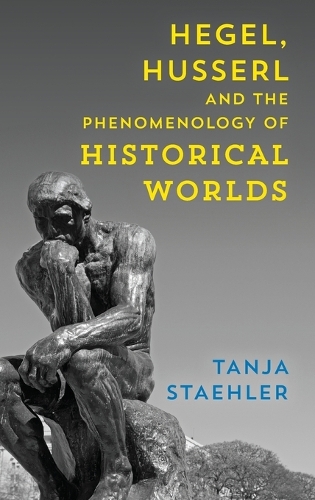
Hegel, Husserl and the Phenomenology of Historical Worlds
(Hardback)
Available Formats
Publishing Details
Hegel, Husserl and the Phenomenology of Historical Worlds
By (Author) Tanja Staehler
Bloomsbury Publishing PLC
Rowman & Littlefield International
7th December 2016
United Kingdom
Classifications
Professional and Scholarly
Non Fiction
142.7
Physical Properties
Hardback
258
Width 161mm, Height 236mm, Spine 21mm
508g
Description
GWF Hegel famously described philosophy as 'its own time apprehended in thoughts', reflecting a desire that we increasingly experience, namely, the desire to understand our complex and fast-changing world. But how can we philosophically describe the world we live in When Hegel attempted his systematic account of the historical world, he needed to conceive of history as rational progress to allow for such description. After the events of the twentieth century, we are rightfully doubtful about such progress. However, in the twentieth century, another German philosopher, Edmund Husserl, attempted a similar project when he realised that a philosophical account of our human experience requires attending to the historical world we live in. According to Husserl, the Western world is a world in crisis. In this book, Tanja Staehler explores how Husserl thus radicalises Hegels philosophy by providing an account of historical movement as open. Husserls phenomenology allows thinking of historical worlds in the plural, without hierarchy, determined by ethics and aesthetics. Staehler argues that, through his radicalization of Hegels philosophy, Husserl provides us with a historical phenomenology and a coherent concept of a culture that points to the future for phenomenology as a philosophy that provides the methodological grounding for a variety of qualitative approaches in the humanities and social sciences.
Reviews
Hegel, Husserl and the Phenomenology of Historical Worlds is a profound treatment of the genesis of life-worlds in their cultural and historical dimensions. Starting with a highly perceptive comparison of Hegel and Husserl as contrasting phenomenologists, Tanja Staehler shows brilliantly how the two thinkers, despite certain affinities, diverge on matters of time and history, the nature of knowledge and the place of others. Derrida and Irigaray emerge as contemporary figures who offer essential correctives to their two German predecessors. The book ends with pellucid reflections on such basic issues as morality, death, and mood. This is a beautifully written text that opens up genuinely new directions of thought for understanding todays troubled world. -- Edward S. Casey, Distinguished Professor of Philosophy, SUNY at Stony Brook; author of The Fate of Place and The World at a Glance.
This is an important study of Hegels philosophy and Husserls phenomenology in relation to each other. Staehler convincingly demonstrates how both Hegel and Husserl approach philosophy through historical and cultural worlds and how their methodologies ultimately relate to Heideggers concept of Being-in-the-world. While Staehler explains the parallels between Hegel and Husserl, she is also sensitive to their differences. The book is well-written, clear and displays a critical sensitivity to methodology. -- Ferit Gven, Professor of Philosophy, Earlham College
Staehlers book is important for bringing bring German Idealism and Phenomenology into dialogue in a way that is illuminating for both traditions. Even more important, however, is the books central question regarding the possibility of philosophical reflection and the centrality of historical embeddedness for its emergence. Her exploration of the issue is lucid and thought-provoking and invites the reader - in the way that philosophy at its best can do - to revisit those aspects of our experience which are fundamental yet mostly unthematized. -- James McGuirk, Professor of Philosophy, Nord University
Author Bio
Tanja Staehler is Reader in Philosophy at the University of Sussex. She is the author of Die Unruhe des Anfangs. Hegel und Husserl auf dem Weg in die Phnomenologie (2003), Plato and Levinas: The Ambiguous Out-Side of Ethics (2010), and (with Michael Lewis) Phenomenology: An Introduction (2010), as well as articles on method, dance and childbirth.
